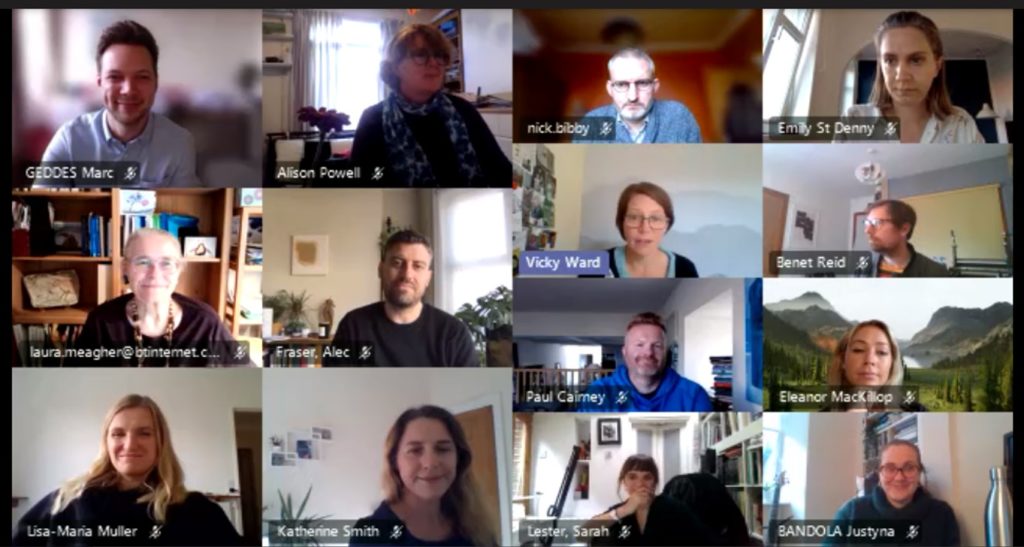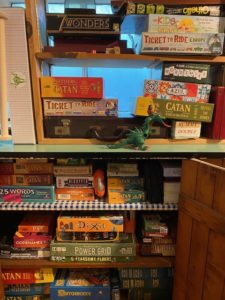Researching policy engagement: what have we learned and where do we go next?
Tuesday 29th September 2020 saw our latest RURU event on the topic of policy engagement. RURU events are usually held in the salubrious surroundings of the Gateway Building Boardroom with stunning views of St Andrews West Sands beach and the distant Angus mountains. Not so this time round (thanks COVID19!). Instead we utilised the wonders of modern technology (or MS Teams) to host our first ever digital RURU event.

This event was organised by RURU in collaboration with the newly-formed Scottish Policy and Research Exchange and our focus was on research-policy engagement. In order to avoid the dreaded Zoom fatigue and maximise time and energy for productive interaction, our three invited speakers (Kat Smith, Mark Monaghan and Nick Bibby) pre-recorded short conversations where they spoke about their research and learning on how researchers and policymakers engage with one another, how research and other forms of knowledge inform policy and the issues and challenges which remain. These conversations were available to watch online for a week before the event, giving people plenty of time for thinking and a space to start interacting with each other via the comments function.
Kat raised some interesting insights about the importance of taking an institutional rather than individualistic approach to policy engagement and the need for large scale investment and commitment over the longer term. She also touched on policymakers’ desire for certainty from researchers, even in the face of complex social problems related to structural environmental factors (e.g. COVID19!). Mark spoke about the role of evidence in criminology and the way in which researchers and policymakers are characterised in terms of their political leaning (Left vs. Right). He also spoke of his surprise at the extent to which different forms of evidence and knowledge are valued by policymakers and the value that is placed on qualitative research. Nick spoke about his experience of engaging with policymakers in different geographical locations and the tendency for researchers to focus on central government policymakers instead of viewing policy more broadly.
Having done their ‘homework’ of watching the videos participants gathered on 29th September for 4 sessions spread across the day. We began with some time for informal chats over coffee in breakout rooms before gathering together for a welcome and brief introduction by RURU Co-Director Vicky Ward. Participants were asked to introduce themselves and to answer the following question:
- If academic/policy engagement were a board game it would be…

We found that we had quite a few self-confessed board game ‘geeks’ amongst us, and there was a stunning array of suggestions! These included the ever-popular snakes and ladders (because academic/policy engagement is idiosyncratic and random), the rather more sophisticated chess (policy engagement is about interaction, power dynamics and all the pieces matter) and the downright frivolous twister (it’s messy, tangled, silly, frustrating and painful before it all comes crashing down)
Session 2 was a series of discussions hosted by our three speakers that focused on participant’s initial reactions to the pre-recorded videos. Each group was asked to generate questions and topics for further group discussion later in the afternoon. Conversations were typically rich and thoughtful leading to the following shared concerns and questions: The impact of the impact agenda on academic/policy engagement and the politics of who gets involved; Public and policymakers understanding of evidence and expertise (what is science and what is it for?); Practical methods and mechanisms for balancing criticality and the maintenance of trust. These topics formed the basis for further group discussion in session 3 with each group making use of a shared notebook in MS Teams to record their insights and share links to further reading and resources.
The final session of the day was a plenary discussion of the insights arising from the small group discussions. Sharing insights across groups prompted another flurry of resource sharing, including ongoing research on the role of emotion in policymaking and approaches to research-policy engagement in different jurisdictions.
Although we weren’t able to provide our usual level of conviviality over shared food and drink in the beautiful setting of St Andrews, it was great to get together with RURU friends for some generative and thoughtful discussion about an undeniably tough topic. Below are some lovely bits of feedback we received from participants.
“I just wanted to thank you for putting on today’s event and for letting me be involved – you did a wonderful job! It felt very refreshing to just be able to talk through ideas without having strict outcomes.”
“I wanted to thank you for putting the event together! Huge kudos on its success – it was so lovely to have real ‘interactions’ even when we have to meet virtually. I suspect we all left with some new ideas – or, even better, new questions!”